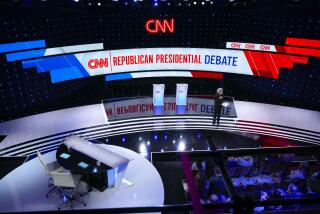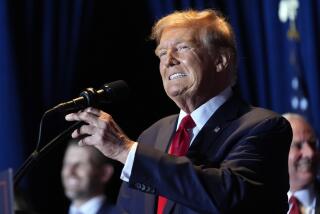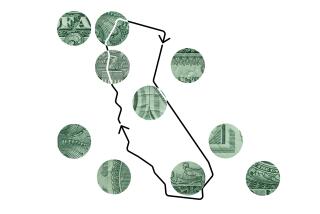Supreme Court may strike new blow to campaign funding laws
WASHINGTON — In what may be Act 2 in the decline and fall of campaign funding laws, the Supreme Court appears poised to lift the lid on the total amount the wealthy can give directly to all candidates and political parties.
Increasingly, the money that funds election races for Congress and the presidency comes from a small sliver of the very rich, what the Sunlight Foundation called the “elite class that serves as gatekeepers of public office in the United States.” The nonpartisan group has tracked how a growing share of election money comes from the top 1% of the wealthiest Americans.
In the first major case of its new term, the court could give those donors even more clout with lawmakers and their parties. The issue is whether federal limits, not on contributions to individual races but on how much a donor can give to all candidates for Congress or party committees in a particular election cycle, violate the right of free speech.
Three years ago, the current court under Chief Justice John G. Roberts Jr. said in the Citizens United case that “independent” spending on election races was protected free speech and struck down long-standing bans on such spending by corporations and unions.
But until now, the court’s conservatives have not joined together to strike down the Watergate-era limits on how much donors can give directly to candidates or party committees.
That has left the law in an odd posture. Wealthy people who want to influence campaign races can give millions of dollars to “super PACs” and other groups that pay for “independent” election ads, but they are barred by law from giving more than $48,600 total to all members of Congress or more than $74,600 to various party committees.
That may be about to change. On Oct. 8, the Supreme Court will take up an appeal from the Republican National Committee, Sen. Mitch McConnell (R-Ky.) and Alabama businessman Shaun McCutcheon, who say contributions should be treated as “core political speech.” If they win, wealthy Republicans or Democrats could each give as much as $3.6 million total by giving the maximum amount to all of their party committees and candidates. This money could be funneled by party leaders into a close race or races, tipping the balance of power in Congress.
Defenders of the election laws have been sounding the alarm. “It would be terrible for our democracy … if one politician could directly solicit $3.6 million from a single donor,” said Lawrence Norden, an election law expert with the Brennan Center, a liberal legal advocacy group in New York. “That is 70 times the median income for an American family. It would mean a tiny, tiny group of donors would wield unprecedented power and influence.”
But the total limit on contributions stands on shaky ground. In recent opinions, Roberts has said the government may not try to “level the playing field” between candidates or prevent well-funded candidates from using their financial advantage to dominate the airwaves. The only justification for limiting contributions, the court has said, is to prevent “corruption or the appearance of corruption.”
And the challengers say there is no threat of corruption if one wealthy person gives the maximum $5,200 to each of more than 460 candidates who run for the House and Senate next year.
“This is a limit on how many candidates you support, not on how much you give them,” said James Bopp Jr., an attorney for the Republican National Committee. He cites the case of McCutcheon, an Alabama man who gave a total of $33,000 to various Republican candidates for Congress last year and wanted to give $21,000 more. He was stopped by the legal limit on total contributions to candidates, which now stands at $48,600.
McCutcheon “holds firm convictions on the proper role of government” and “opposes numerous and ill-conceived and overreaching laws,” he told the court, and he wants more “federal officeholders who share his beliefs.”
Bopp said a court decision lifting the total contributions limit would not give an unfair advantage to either side in American politics. “There are as many rich liberal people as rich conservative people,” he said.
Lee Drutman, a researcher at the Sunlight Foundation, disagrees. “The data shows there are more big donors on the right than on the left,” he said.
But a win for McCutcheon and the Republican National Committee would seemingly affect only a few thousand generous givers. Last year, about 1,700 donors bumped up against the limit on contributions to party committees. And only about 600 donors hit the maximum of $48,600 in contributions to all candidates.
The partisan divide on the campaign funding limits is stark and clear. The Republican campaign committees have joined in urging the court to strike down the limits, while House Democrats have joined the Obama administration in defending them. The court has been similarly divided, with the five Republican appointees joining recent rulings to strike down limits, while the four Democratic appointees dissented.
Fred Wertheimer, a longtime champion of the campaign funding laws, remains optimistic that the limits will survive — and because of Roberts.
Roberts “is likely to be the key vote in deciding this case,” Wertheimer said, and he “has a different record on campaign finance issues than his conservative colleagues.”
Wertheimer added, however: “If the Supreme Court reverses its past position and strikes down the long-standing aggregate contribution limits, it will open the door wide to corruption of our federal officeholders and government decisions.”
More to Read
Start your day right
Sign up for Essential California for news, features and recommendations from the L.A. Times and beyond in your inbox six days a week.
You may occasionally receive promotional content from the Los Angeles Times.






